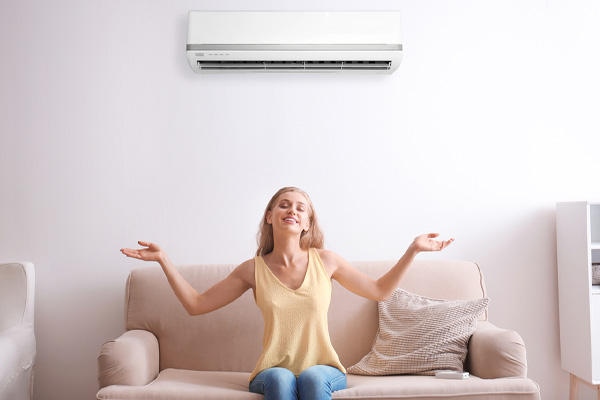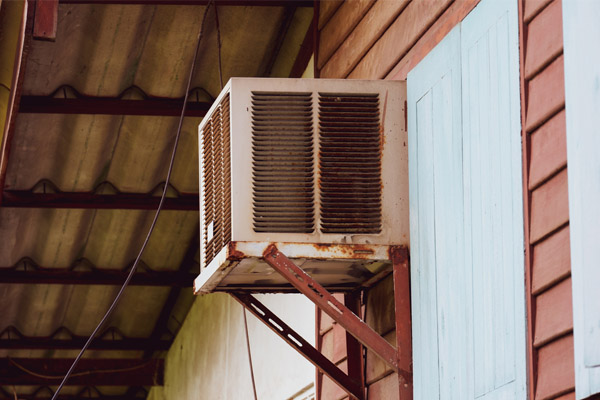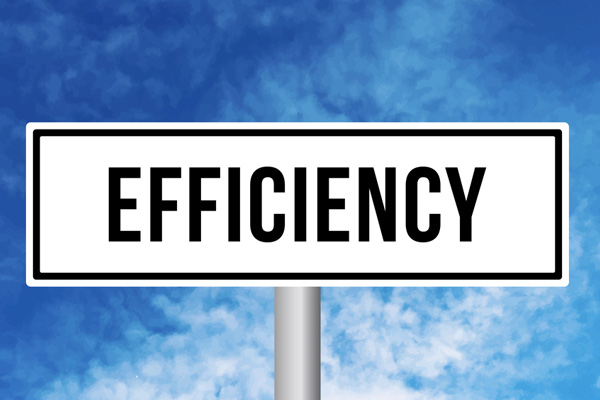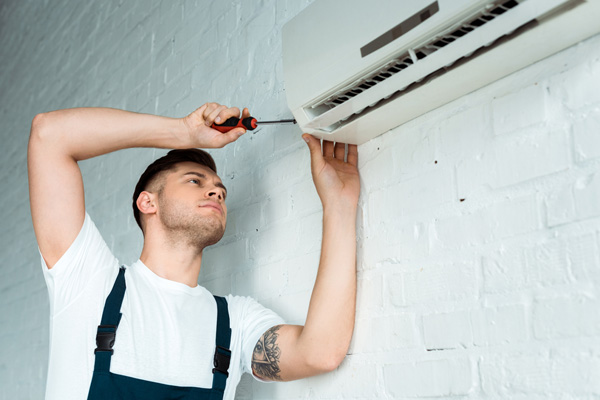Ductless HVAC vs. Window AC: Your Cooling Conundrum Solved

Homeowners are often faced with the challenge of selecting the most suitable air conditioning solution. Among the myriad options available, ductless HVAC and window air conditioning units stand out as popular choices for their distinct advantages and application suitability.
The importance of making an informed decision cannot be overstated, as it directly influences the ambient comfort, energy efficiency, and cost-effectiveness of a home’s cooling system. This article by McAllister Energy aims to demystify the selection process by thoroughly examining the advantages and disadvantages of ductless and window AC units.
Comparison of Ductless & Window Air Conditioning Systems
Contents
- 1 Comparison of Ductless & Window Air Conditioning Systems
- 2 Advantages of Ductless Air Conditioning Systems
- 3 Considerations for Selecting Residential Air Conditioners
- 4 Ductless HVAC vs. Window Cooling Systems – FAQs
- 4.1 How do ductless HVAC systems improve indoor air quality?
- 4.2 What is SEER, and how does it affect efficiency?
- 4.3 Can ductless HVAC systems be installed in older homes without existing ductwork?
- 4.4 What maintenance is required for ductless HVAC vs. window AC systems?
- 4.5 Do ductless systems provide heating as well as cooling?
- 5 Conclusion
- 6 Call McAllister Energy for Comprehensive HVAC Services
Here is a comparison of these two cooling systems:
Ductless Cooling Systems

Ductless air conditioning systems, also known as mini-split systems, comprise two main components: an outdoor compressor/condenser and one or more indoor air handling units. These components are connected by a conduit, facilitating the transfer of cooled air directly into the living space.
The installation process, though more involved than that of window units, offers unparalleled benefits. Ductless AC systems are lauded for their energy efficiency, given their ability to cool specific zones within a home without the energy losses associated with ductwork. Additionally, they offer remarkable flexibility in terms of installation locations and are beneficial for indoor air quality, as they do not require a connection to existing ductwork, which can often harbor dust and allergens.
Window Air Conditioning Units

Window air conditioning units are designed for a straightforward, do-it-yourself installation process, fitting into a window frame and plugging into a standard electrical outlet. This simplicity, however, comes with its own set of limitations.
Window AC systems generally have a restricted cooling capacity, making them suitable primarily for single-room applications. Furthermore, because they interface directly with the outdoor environment, they can potentially introduce and circulate outdoor air pollutants indoors, impacting the overall air quality within the space. This inherent limitation underscores the need for homeowners to carefully consider their specific cooling requirements and indoor air quality concerns when choosing between ductless and window AC systems.
Advantages of Ductless Air Conditioning Systems
Ductless air conditioning systems offer several compelling advantages, including:
Highly Efficient

Ductless air conditioning systems boast superior Seasonal Energy Efficiency Ratios (SEER) compared to window units, leading to lower energy usage and significant savings on utility bills. Their advanced technology ensures optimal cooling efficiency with minimal waste.
No Energy Loss
Eliminating the energy loss common in ducted systems, ductless AC units bypass the need for ductwork. This direct cooling approach prevents the 30% energy loss seen in traditional systems, especially those with ducts in unconditioned spaces, enhancing overall energy efficiency.
Versatile Ductless HVAC Installation

Offering flexibility, ductless systems can be installed almost anywhere in the home, allowing for targeted cooling and the creation of zoned areas. This adaptability improves comfort and reduces energy consumption by cooling only occupied spaces.
Improved Indoor Air Quality
Ductless air conditioners improve indoor air quality through advanced filtration systems that remove dust, allergens, and other pollutants. This feature is crucial for individuals with allergies or respiratory concerns, making these systems a healthier choice for home cooling.
Considerations for Selecting Residential Air Conditioners

Here are several factors to consider when choosing an air conditioner for your home:
Air Conditioner Cost Considerations
Cost plays a pivotal role in selecting a residential air conditioner. The initial purchase and installation cost of ductless systems tend to be higher than window units. However, their superior energy efficiency can lead to significant long-term savings on electricity bills.
Additionally, maintenance costs and warranty coverage vary between models and manufacturers, impacting the total cost of ownership. Homeowners should weigh these factors, considering both short-term expenses and long-term savings.
Suitability For Different Home Configurations
The choice between window units and ductless systems also depends on home configurations and installation possibilities. Window ACs offer a straightforward, DIY installation for temporary or seasonal use, making them suitable for renters or those needing a quick solution.
In contrast, ductless systems provide a permanent, more aesthetically pleasing option with flexible installation locations. Their ability to cool specific zones through multiple indoor units makes them ideal for homes requiring varying temperature controls across different rooms.
AC Unit Noise & Air Quality Considerations
Noise levels are a crucial comfort factor. Window units often produce more audible operational sounds, which might disturb the indoor environment, especially in bedrooms or quiet areas. Ductless systems are generally quieter, with the noisiest components installed outside.
Regarding indoor air quality, ductless units have advanced filtration systems that enhance air quality by removing pollutants and allergens. This feature particularly benefits individuals with allergies or respiratory issues, underscoring the importance of considering noise and air quality when choosing an air conditioning system.
Ready to upgrade your home cooling system? Contact McAllister Energy today for a free, in-home consultation and learn the benefits of ductless air conditioning!
Ductless HVAC vs. Window Cooling Systems – FAQs

Below are several frequently asked questions regarding ductless versus window ACs.
How do ductless HVAC systems improve indoor air quality?
Ductless systems come with advanced filtration capabilities that capture and remove dust, allergens, and other airborne pollutants, significantly improving indoor air quality.
What is SEER, and how does it affect efficiency?
SEER (Seasonal Energy Efficiency Ratio) measures air conditioning cooling efficiency. Higher SEER ratings indicate greater energy efficiency, reducing electricity costs and your environmental impact.
Can ductless HVAC systems be installed in older homes without existing ductwork?
Yes, ductless systems are ideal for older homes without existing ductwork. Their flexible installation options eliminate the need for costly and invasive duct installation projects.
What maintenance is required for ductless HVAC vs. window AC systems?
Both systems require regular cleaning of filters and outdoor units to maintain efficiency. Ductless systems may also need professional servicing to ensure the indoor units and conduits remain in optimal condition, while window units often require seasonal installation and removal.
Do ductless systems provide heating as well as cooling?
Yes, many ductless systems are designed as heat pumps, offering heating and cooling capabilities. This dual functionality makes them versatile for year-round climate control in various climates.
Conclusion
Choosing between ductless and window AC systems hinges on efficiency, installation flexibility, and air quality, with ductless units generally offering superior SEER ratings, no duct-related energy loss, and better filtration. Homeowners should evaluate their specific needs, considering both the advantages and limitations of each system.
McAllister Energy stands ready to offer personalized advice, guiding you toward the most suitable HVAC solution. We encourage contacting McAllister Energy for expert consultation and assistance to ensure your home’s comfort and efficiency are optimally addressed.
Call McAllister Energy for Comprehensive HVAC Services
In the realm of heating and cooling solutions in Southern New Jersey, McAllister Energy is a name synonymous with excellence. Our highly trained and professionally certified technicians are all an expert in various HVAC services, including regular tune-ups, meticulous repairs, professional installations, and efficient replacements. Their proficiency guarantees your HVAC system receives unparalleled care and attention.
At McAllister Energy, we are dedicated to providing heating and cooling services that are both effective and economically viable. Our maintenance services can aid in enhancing your comfort and boosting your system’s energy efficiency, reducing heating and cooling costs. For those needing repairs or replacements, we offer competitively priced solutions, customized to meet your specific requirements and backed by our commitment to your satisfaction. For a complimentary in-home estimate or to schedule a service, reach out to McAllister Energy today.
You can click here to contact us now or call us at (856) 665-4545 to find out more! Click the link to view our service area.

Related Articles:
- Why Ductless Is Your Top Basement Air Conditioner Option
- The Role of HVAC Systems in Maintaining Indoor Air Quality
- Attic Air Conditioner: What You Should Be Looking For?
- Why Use A Ductless Air Conditioner For An Oil-Heated Home Without Ducts?
- Ductless Mini-Split Lifespan: How Long Should My Unit Last?